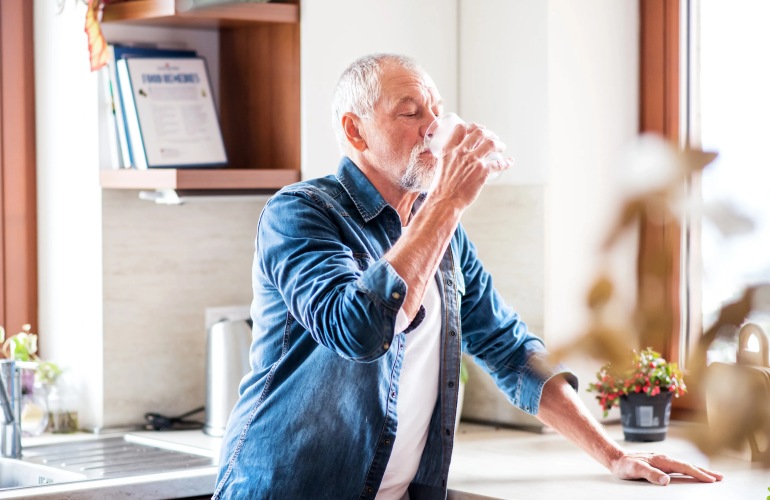Water is much more than just a thirst quencher. Essential to almost all bodily functions, from joint lubrication to pumping blood to our hearts, water is literally our predominant life force, a vital element to our survival. It’s no surprise staying properly hydrated is key to maintaining good health.
Simply put, when you are well hydrated, your body can function correctly. When you are dehydrated, it cannot.
At any age, without consistent, appropriate fluid intake, the elegant machine we call a body cannot possibly perform to expectation. Dehydration in older adults is even more of an issue. For starters, the sense of thirst diminishes with age, making it less obvious that it’s time to drink. Ironically, the less one drinks, the less one wants to drink. This can quickly become a chain reaction that leads to dehydration. Add some medications like laxatives and diuretics, and health issues like kidney disease and Alzheimer’s, to the mix and you have a recipe for trouble.
Why is staying hydrated so important? Consider this long list of potential dehydration complications.
- Confusion
- Tiredness
- Lightheadedness
- Dry mouth, lips, eyes, or skin
- Low blood pressure
- Disorientation
- Problems with memory
- Poor concentration
- Regulate body temperature
- More hydrated skin
- Reduce digestive stress/discomfort
- Decrease risk of falls
- Better ability to focus and enjoy time spent doing things you love
- Higher energy levels
Keep it Interesting
Water doesn’t have to be boring! Liven it up with lemon or cucumber slices. Or take your liquid creativity one step further and add flavor and color with your favorite fruits and berries. Low sugar sports drinks and nutritional shakes specifically designed to eliminate dehydration in the elderly are also good options. Though you may love your coffee and tea, both can be slightly dehydrating so should not be considered as part of your daily liquid quota.
Your Favorite Water Bottle: Don’t Leave Home Without it
There are so many cool water bottles to choose from and many have great motivational sayings printed on them. Some are even calibrated to measure your daily volume. Choose one that inspires you and keep it handy – and filled - throughout the day.
Drink While You Eat
Strategically consuming foods high in water content are an excellent contribution to hydration goals. For example:
- Lettuce: 96% water
- Celery: 95% water
- Zucchini: 95% water
- Cabbage: 92% water
- Watermelon: 91% water
- Cantaloupe: 90% water
- Honeydew melon: 90% water
Create a Sipping Schedule
Drinking at certain times every day makes it a healthy habit that just becomes a natural part of your routine. For example, try consuming a glass of water when you wake up in the morning, after every meal and before and after exercise. Before you know it, you will have added important ounces to your daily diet.
How Much Water Should an Elderly Person Drink in a Day?
According to the National Council on Aging, a good rule of thumb is to take a third of your body weight and drink that number of fluid ounces daily. For example, if you weigh 150 pounds, aim for 50 ounces of water each day. That said, it is still recommended to discuss your daily water intake with your doctor, who will consider factors like medications and health conditions.
Join one of Overture’s premier active adult communities and achieve your health goals with the support of like-minded peers. Remember, when it comes to the importance of staying hydrated, the facts are crystal clear.

